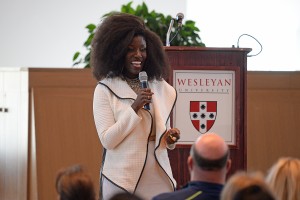Apple Music’s Saint John ’99 Recalls Formative Wes Moments in WesFest Keynote

Bozoma “Boz” Saint John ’99, head of global consumer marketing for Apple Music and iTunes, wowed attendees at WesFest—admitted students and their parents— as keynote speaker.
The eldest daughter of Wesleyan ethnomusicology graduate Dr. Appianda Arthur PhD ’77, Saint John spoke on Wesleyan’s powerful influence on her life today.
Her father, recalling his formative years at Wesleyan and the lively intellectual community, had encouraged her to attend Wesleyan. Although her desire to rebel figured in early in the decision process, she ultimately chose Wesleyan. “My father was so excited when I decided Wesleyan was the school for me, but he stopped short of saying, ‘I told you so,’” she recalled.
What she’d found on campus was an intellectual home—a place of lively discourse and diverse fields of study. “Coming to Wesleyan I found a deeper level of connection to students who had varied interests in things, in a way I hadn’t felt before with classmates …. It felt like coming to a big camp with people who looked at the world the way I did—a little left of center.”
While initially prepared to find herself on the pre-med track (“I was good at science and math”), she discovered that her interest in pop culture offered an avenue for intellectual exploration, and she recalled a particularly formative opportunity.
It was during her undergraduate years that one of her favorite musicians, the rapper Tupac Shakur, was murdered. “I thought—’There’s something to be learned here.’ I took that thought and found there was an elective being taught at USC about rap and its influence on culture. I approached my American Studies professor, who seemed knowledgeable. ‘I would love to be able to have a class on the lyrics of Tupak Shakur,’ I told him.
“He looked at me and said, ‘It sounds interesting. I don’t have the time to teach this, but I’d sponsor you, if you wanted to teach this course.’”
She recalled dismissing his idea as one she wasn’t qualified to consider: “Who me? I can’t do that; I’m just a fan.”
“Of course you can,” he responded.
Saint John spent the next month transcribing every lyric Shakur had written and recalls the laborious process with her tape player: listening, jotting down what she heard, rewinding, pressing play and listening again—for as many times as it took until she was sure she had them correct and complete.
She returned to her amazed professor with the sheaf of transcribed songs, and he helped her develop a course that she taught. “We had 30 students for this noncredit course—a course just to learn something. The next semester, we had 30 people in the class and a 60-person wait list, and the semester after that, he took it on himself,” she recalls.
“To me, that is the truest testament to what education is like at Wesleyan is: An idea that might have been dismissed as trite—I mean it doesn’t affect anything—was taken very seriously here. It was validated. I can tell you, that has had a profound effect on what I do today, how I look at the world today, how I look at my ideas and the validity I give them was born here. I was validated here, both for my cognitive thinking skills as well for the application that I envisioned. I could see the concept as a tangible real thing to have discourse around.
“That turned the corner for me. The passion I felt for that particular experience changed my mind about what I wanted to do with my career. I had the opportunity to explore so much of what I considered the pop culture education, that it set me up for what I’m doing now.”

